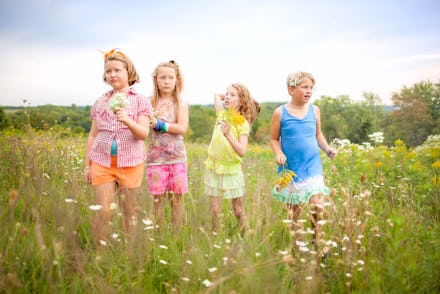13 Stunning Photos Reveal What Happens When Gender Nonconforming Kids Have Their Own Space

For some, summer camp is a refuge from the rigors of daily life and school. For the estimated 1 in 500 significantly gender nonconforming or transgender children, escaping the trappings of everyday life and societal judgment can be life-changing.
That's why the families of gender nonconforming youth joined forces nine years ago to create a summer camp-like experience where their loved ones could feel free to explore their authentic selves. Photographer Lindsay Morris, who first attended eight years ago with a loved one, documented this exploration over the course of several years. The result is a beautiful photo series titled "You Are You."
Because the camp is organized and facilitated by the family members of gender nonconforming youth, all attendees are expected to pull their weight, Morris told Mic. "You Are You" was a result of her assigned role as documentarian, so other parents and family members could accomplish other tasks. But Morris eventually realized these images were more than sentimental keepsakes. "A beautiful and telling narrative began to unfold," she said.
The concept of gender nonconformity was widely unknown when the camp first opened years ago, and still largely is, Morris said. Plenty hold misconceptions including that being gender nonconforming is "the person's choice, or worse yet, that the parents support for a child is misconstrued as desire for a child of the opposite gender," she said.
For this reason, the parents at the camp collectively decided that even though there is still "fear and shame associated with gender nonconformity," showing the public these images is crucial to raise awareness among others and encourage gender nonconforming individuals to feel validated in their experience.
"It's one thing to read about or hear a story, but it's quite another to hold the unfaltering gaze of the subject in a portrait," Morris said. "Or to experience the poetic moments that happen in between the chaos, where in this case, we witness the children experiencing authenticity, some of them for the first time."
And it's this authenticity that perhaps struck Morris the most about her subjects. Many of the children actively encouraged her to document them. The photographer credits the comfort of the "heart-opening, judgment-free environment" of the camp with this confidence, and it's an environment she hopes these images will at least contribute to re-creating in the world beyond this camp.
But while the children featured in "You Are You" felt free to explore their gender identity at this unprecedented camp, some who may be isolated and not know there are others who feel the same way may hide what they believe is an unparalleled, personal anomaly. The fact that the identity is not completely rare has only gained public attention recently, Morris and gender nonconforming activist John Kelly both confirmed.
"People expressing their gender identities in non-normative or non-traditional ways is by no ways a 'new' thing, nor is it a Western thing," Kelly said. While terms like "genderqueer" and "gender nonconforming" are "situated in our time and place," Kelly added, "that doesn't mean the feelings or expressions themselves are new or peculiar."
Popularizing images of gender nonconforming people is not just crucial for raising awareness about this experience but also for generating a broader environment of acceptance. Considering that, as Kelly said, "gender nonconforming individuals are at a high risk for youth homelessness, depression and intimate partner violence," normalizing this identity could do much to generate a safer environment for this group.
Gender as a journey: Kelly warns increased visibility of gender nonconforming people should not create a brand new type of rigid gender identity. If anything, Kelly said, gender nonconformity should be an umbrella term for the many ways someone can express their gender.
"I'm hesitant to slap a monolithic label upon gender non-conformity, for indeed that type of stifling of creativity and honesty repels so many of us from a binary-only approach," Kelly said. "Our static understanding of identity denigrates the idea of identity-as-journey. Sometimes, identities shift and change over time and place for a single person; other times they are constant, and both of those are valid."
Pictures, therefore, may speak louder than words or labels — a tenet Morris believes in. "Only through visibility do we move the conversation forward," she told Mic, adding she hopes to follow future significant moments in these children's lives in order to continue to generate understanding and empathy.
Ultimately, Morris said she hopes viewers will come away understanding that these families are ordinary. "Brave, loving, intelligent people, yes, but ordinary in the sense that their love for children is as basic as anyone else's," she says. "And like anyone else, they want to see their children move forward and lead happy and productive lives. Unsupported children do not have the luxury of normalcy."
Thanks to these images, and the important work they do to normalize this experience, it seems support for the right of these children to live their most authentic lives will only continue to grow.